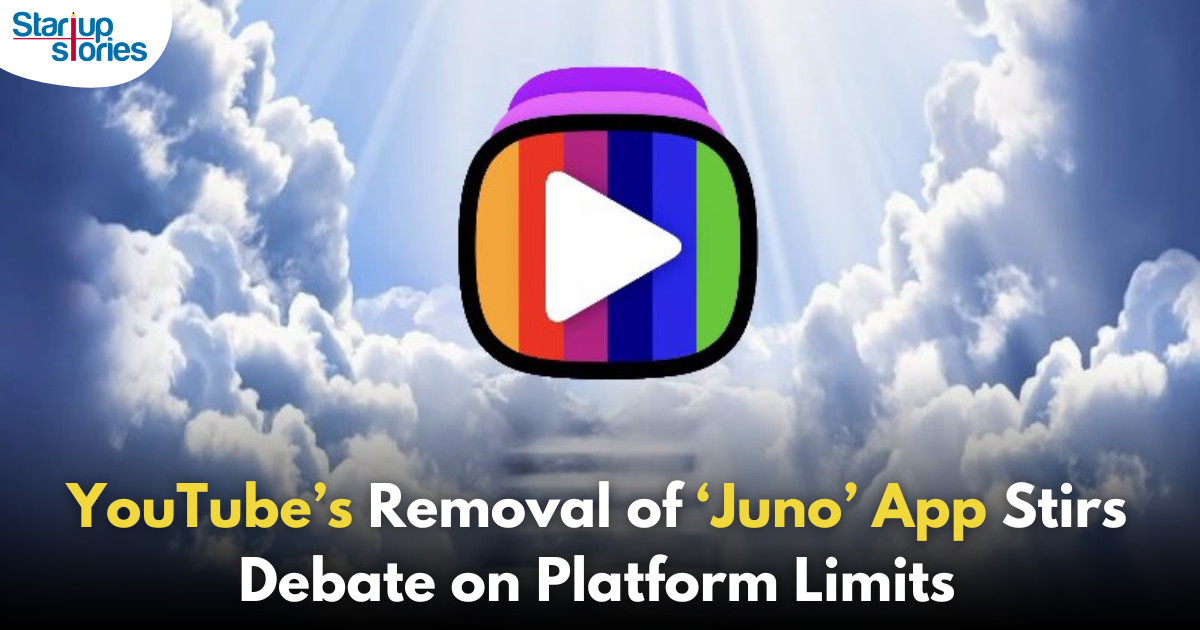Latest News
YouTube Demands Removal of ‘Juno’ from Apple’s Vision Pro; Developer Responds!

In a recent blog post, developer Cristian Selig announced the removal of his Vision Pro app, Juno, from the App Store after YouTube requested Apple take it down. Juno provided a simplified web view of YouTube content optimized for Apple’s Vision Pro mixed-reality headset. However, despite YouTube not having an official app for the Vision Pro, the Google-owned platform reportedly cited guideline violations to justify the takedown, leaving the developer disheartened and puzzled.
Developer’s Clarification
Selig, well-known for the Reddit app Apollo, clarified in his post that Juno didn’t alter YouTube’s content or interface in any significant way, aside from a few aesthetic modifications to better suit the Vision Pro’s interface. He emphasized that Juno functioned primarily as a web viewer, with minimal CSS adjustments to enhance compatibility with visionOS, while maintaining all logos and respecting YouTube’s branding guidelines. The app also didn’t interfere with YouTube ads or suggest any official affiliation with YouTube.
“For those who enjoyed Juno, it should continue to work for now—until a YouTube site update potentially changes that,” Selig said. “I built this app for fun and to gain experience with Vision Pro, so I don’t intend to escalate the issue further.”
Implications of the Takedown
YouTube’s decision underscores the ongoing challenges third-party developers face when navigating platform policies set by major tech companies. Selig expressed frustration over YouTube’s unwillingness to clarify their objections, sharing that discussions reached a standstill before Apple notified him of Juno’s removal.
AppleInsider noted that Juno’s removal raises questions about the future of other third-party YouTube clients on Vision Pro. One such app, Television by Sandwich, similarly enables YouTube viewing via visionOS within a retro TV model. Whether YouTube will pursue similar actions against these alternatives remains uncertain, but the incident highlights the tightrope independent developers walk when offering access to content on restricted platforms like YouTube.
Future of Third-Party Apps
Selig’s farewell to Juno leaves Vision Pro users without an optimized YouTube solution for now, underscoring the unique obstacles faced by developers and users alike on emerging technologies. As the demand for immersive content grows, developers may find it increasingly difficult to create apps that comply with platform policies while still providing valuable services.
Context on YouTube’s App Development
Currently, there is no official YouTube app available for the Apple Vision Pro. Users have been relying on third-party applications like Juno or accessing YouTube through Safari. A spokesperson from YouTube has indicated that an official app is in development but has not provided a timeline for its release.
Conclusion
The removal of Juno from the App Store serves as a reminder of the complexities involved in developing applications that interact with major platforms like YouTube. As independent developers navigate these challenges, users are left seeking alternative solutions for accessing their favorite content on new technologies like the Apple Vision Pro.
The incident raises important questions about the future of third-party applications in an ecosystem where major companies exert significant control over content access and distribution. As developers continue to innovate in this space, it will be crucial for them to find ways to comply with platform guidelines while still delivering unique and engaging user experiences.
Latest News
Peak XV New Funds: $1.3B Commitment for India Startup Surge 2026

Peak XV Partners has launched three new funds totaling $1.3 billion, targeting India’s booming startup ecosystem. The lineup features the $600M Surge fund (8th edition) for early-stage ventures, a $300M Growth Fund for Series B+ scaling, and a $400M Acceleration Fund for rapid portfolio expansion. This commitment arrives as India’s VC inflows rebound, with AI and fintech leading 2026 trends.
These funds build on Peak XV’s legacy of backing unicorns like Zomato and Pine Labs, offering founders capital plus strategic guidance amid post-winter recovery. Early-stage deals surged 20% last year per Tracxn, positioning Peak XV to fuel the next wave of innovation in SaaS, climate tech, and consumer plays.
For startups eyeing Peak XV new funds or Surge fund 2026 applications, this signals prime opportunities. Investors and marketers should watch for deployment updates India remains a global VC hotspot.
Latest News
D2C Brand Neeman’s Raises $4 Million for Tier 2/3 Store Expansion & Eco-Friendly Shoes

Hyderabad, January 13, 2026 Neeman’s, India’s leading D2C footwear brand famed for sustainable shoes and patented PIXLL® technology, has raised $4 million from existing investors. This funding boosts its cumulative capital past $10 million since 2015, with a post-money valuation nearing $50 million. CEO Vijay Chahoria emphasized offline retail as the “next frontier,” planning 50+ new stores in Tier 2/3 cities like Jaipur and Lucknow to blend eco-friendly innovation with hands-on customer experiences.
In India’s booming D2C ecosystem where footwear sales hit ₹1.2 lakh crore in 2025 Neeman’s targets hybrid retail amid high online CAC and 25-30% returns. Backed by vegan, machine-washable shoes priced ₹2,000-4,000, the brand leverages PIXLL® (5x more breathable than leather) for carbon-neutral comfort. Recent 5x revenue growth to ₹100 crore ARR, 1M+ pairs sold via Myntra and stores, and awards at India D2C Summit 2025 position it ahead of rivals like Paaduks.
Neeman’s offline expansion India eyes the $15B sustainable footwear market by 2028, fueled by PLI schemes, Gen Z’s 70% eco-preference (Nielsen), and Southeast Asia exports. Challenges like real estate costs are offset by data-driven inventory and omnichannel QR tech. Watch for Q1 2026 launches in Hyderabad and Bengaluru redefining D2C success through authentic, “Wear the Change” branding.
Latest News
Centre Mulls Revoking X’s Safe Harbour Over Grok Misuse

The Centre is weighing the option of revoking X’s safe harbour status in India after its AI chatbot Grok was allegedly misused to generate and circulate obscene and sexually explicit content, including material seemingly involving minors. The IT Ministry has already issued a notice to X, directing the platform to remove unlawful content, fix Grok’s safeguards, act against violators, and submit a detailed compliance report within a tight deadline. If the government finds X’s response inadequate, it could argue that the platform has failed to meet due‑diligence standards under Indian law, opening the door to harsher action.
Under Section 79 of the IT Act, safe harbour protects intermediaries like X from being held directly liable for user‑generated content, provided they follow due‑diligence rules and promptly act on legal takedown orders. Revoking this protection would mean X and its officers could be exposed to criminal and civil liability for obscene, unlawful, or harmful content that remains on the platform, including AI‑generated images from Grok. This prospect significantly raises X’s compliance risk in India and could force tighter moderation, stricter AI controls, and more aggressive removal of flagged posts.
The Grok episode also spotlights the regulatory grey zone around generative AI, where tools can create harmful content at scale even without traditional user uploads. Policymakers are increasingly questioning whether AI outputs should still enjoy the same intermediary protections as conventional user posts, especially when they involve women and children. How the government ultimately proceeds against X over Grok misuse could set a precedent for AI accountability, platform responsibility, and safe harbour interpretation in India’s fast‑evolving digital ecosystem.













binance sign up bonus
June 30, 2025 at 4:48 am
Thank you for your sharing. I am worried that I lack creative ideas. It is your article that makes me full of hope. Thank you. But, I have a question, can you help me?
binance
August 4, 2025 at 8:08 am
Thank you for your sharing. I am worried that I lack creative ideas. It is your article that makes me full of hope. Thank you. But, I have a question, can you help me?
GO88
November 6, 2025 at 5:09 pm
Tham gia cộng đồng game thủ tại Go88 để trải nghiệm các trò chơi bài, poker phổ biến nhất hiện nay.
谷歌站群
November 7, 2025 at 1:23 am
专业构建与管理谷歌站群网络,助力品牌实现全域流量的强势增长。谷歌站群
iwin
November 7, 2025 at 10:20 pm
iwin – nền tảng game bài đổi thưởng uy tín, nơi bạn có thể thử vận may và tận hưởng nhiều tựa game hấp
MM88
November 10, 2025 at 2:09 pm
Với giao diện mượt mà và ưu đãi hấp dẫn, MM88 là lựa chọn lý tưởng cho các tín đồ giải trí trực tuyến.
站群程序
November 10, 2025 at 9:12 pm
搭载智能站群程序,自动化搭建与管理,为SEO项目提供核心驱动力。站群程序
站群程序
November 11, 2025 at 5:32 pm
搭载智能站群程序,自动化搭建与管理,为SEO项目提供核心驱动力。站群程序
Kuwin
November 13, 2025 at 6:38 am
kuwin sở hữu kho game đa dạng từ slot đến trò chơi bài đổi thưởng, mang đến cho bạn những giây phút giải trí tuyệt vời.
binance
November 14, 2025 at 5:54 am
Your article helped me a lot, is there any more related content? Thanks!
MM88
November 22, 2025 at 9:50 am
Khám phá thế giới giải trí trực tuyến đỉnh cao tại MM88, nơi mang đến những trải nghiệm cá cược thể thao và casino sống động.
binance odkazov'y kód
December 18, 2025 at 5:06 pm
Your point of view caught my eye and was very interesting. Thanks. I have a question for you.